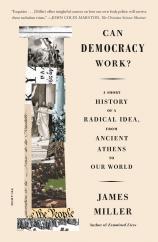Reading Group Guide
Discussion Questions
Can Democracy Work?: A Short History of a Radical Idea, from Ancient Athens to Our World

1. Discuss the book’s title: can democracy work? As you learned about democracy’s history, did you become more or less confident in the will of the people?
2. Should compulsory government service with selection by lottery --- or any other aspects of the Athenian Assembly (Ekklesia) --- be adopted by the United States? Should we revise the qualifications for becoming a legislator, judge or juror?
3. How did you react to the “democratic” movements that restricted political power to property-owning white men? What did societies lose --- culturally and intellectually --- by suppressing the voices of women, slaves and those who lived in poverty?
4. On page 72, the historian Simon Schama is quoted as saying, “Bloodshed was not the unfortunate by-product of revolution, it was the source of its energy.” Do you agree? Was the Jacobin Reign of Terror the inevitable price for freeing France from monarchy? What determines whether military forces protect or abuse the powerless?
5. Which is less dangerous: direct democracy or indirect representation? Should the Electoral College be abolished in the United States?
6. From the oracle at Delphi to the U.S. Constitution, how has religion influenced the evolution of democracy?
7. As the architect of the first democratic constitution, Condorcet proposed a complex network of public assemblies in which every citizen would have “the knowledge necessary to conduct himself in the ordinary affairs of life, according to the light of his own reason, to preserve his mind free from prejudice” (page 200). What does it take to ensure that citizens are knowledgeable and reasonable?
8. The book illustrates the widely varying definitions of democracy, evolving from a radical Athenian regulatory body to Madison’s tempered republic and the Jeffersonian ideal that led self-made men like Andrew Jackson to rise to the highest office in the land. Now that you’ve read the saga of democracy, how do you personally define it? Do you think it can thrive among all populations of demos (ordinary citizens)?
9. The author calls the rise of the early American political party a normalizer, with elections becoming the cornerstone of our democracy. Does the rise of advertising and professionalized propaganda in the era of Edward Bernays, and the spread of social media a century later, threaten those cornerstones? Should journalists, political advertisers and publicists, and grassroots communicators all be held to the same legal standards when they publish their messages?
10. The Bolshevik orator Leon Trotsky and his followers advocated industrial democracy, and militant union activism was at the core of the revolutionary spirit sweeping Europe at the turn of the last century. Was William Morris right to advocate a rejection of factories and a return to an artisanal approach to production? Are capitalism and industrialism at odds with democracy? Is socialism the best way to ensure that more of humanity will enjoy a better quality of life?
11. What were the primary forces that undermined Woodrow Wilson’s new world order for peace?
12. Which of the book’s lesser-known democracy movements, from the London Chartists (who idolized Robespierre) to the German insurrectionist Karl Schapper and Italy’s secret Carbonari network, were most interesting to you? What common incentives and vulnerabilities did these groups share?
13. As you read the coda, what recent experiences from your own community came to mind? Do you share Huntington’s eventual belief that democracy is fragile, with a cloudy future?
14. How does CAN DEMOCRACY WORK? enhance any previous books you’ve read by James Miller? What common threads are woven into the history of democracy and the rise of rock and roll (FLOWERS IN THE DUSTBIN), as well as 1960s youth activism (“DEMOCRACY IS IN THE STREETS”)?
Can Democracy Work?: A Short History of a Radical Idea, from Ancient Athens to Our World
- Publication Date: September 10, 2019
- Genres: History, Nonfiction, Political Science
- Paperback: 320 pages
- Publisher: Picador
- ISBN-10: 1250234670
- ISBN-13: 9781250234674







